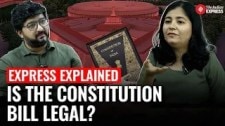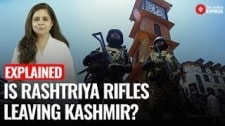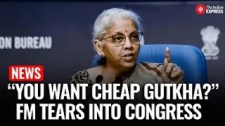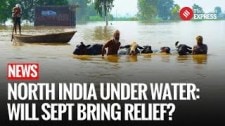-
‘We Were Voted to Confront Delhi’: Srinagar MP Aga Ruhullah Slams Govt on 370, Pahalgam Attack
In an exclusive interview with The Indian Express, Srinagar MP Aga Syed Ruhullah Mehdi opens up on Article 370, statehood, rising militancy, the Pahalgam terror attack and the silence around political accountability in Kashmir. Question: Debate on Operation Sindoor is over in Lok Sabha and Rajya Sabha. Both the Home Minister and Prime Minister have spoken. They categorically said that innocent tourists were killed after identifying or ascertaining their identities, meaning all of them who were killed in the Pahalgam attack were Hindus. So, NIA is now investigating the claim, and they are trying to find out whether it was correct or not. I am joined by an MP from Srinagar, Aga Ruhullah Mehdi saab. Sir, thank you so much for speaking to Indian Express. First thing I would like to ask from you is, when such voices are raised in Parliament – that people are associated with terrorism belonging to a certain faith – how do you react to that? Answer: Well, it's a fact that people come from different faiths and they do acts of different kinds. To associate an act with a religion is not justified, if you go by that logic. I mean, a few months ago before Pahalgam, there was a railway police officer in Rajasthan who identified some Muslims in that train and chose to kill them. And that was reported in newspapers, media, everywhere and that was someone in uniform. He killed that person for being Muslim. So would I blame every Hindu for that? Would I blame Hindu religion for that? No, that's not the case. There have been killings of millions of people in the name of religion. Christianity has — people from Christianity have done that. People from different faiths have done that. People belonging to Muslim faith have done that. And I can quote many examples where people from Hindu faith have done acts of violence. That does not, I mean, justify to say that this terrorism is a product of a particular religion. What is the answer to the lynching then? The lynching that takes place on the streets of India, where Muslims are killed for being Muslims and killed by members of other religions. Should I blame every Hindu for that lynching? Should I blame the Hindu religion for that lynching? No. We know that it's a fringe. It is someone who does not represent his religion or her religion. He has nothing to do with his or her religion. I do not blame Hindu religion for that. I do not blame Christianity for that. I do not blame any other religion for that. So why do people – conveniently, those in power today in India – why do they conveniently try to, I mean, colour the religion of Islam in one paint – and that is terrorism? Question: As you know, this debate, when it was going on, many believe that this was the time when the issue of statehood should have also been discussed. Some MPs, including you, were also hopeful. Do you think this is an opportunity lost? Answer: Every day is an opportunity lost. And this one, especially, yes. Not only about the statehood, but also about the 370, (it) was snatched from the people of Jammu and Kashmir undemocratically. And this was an opportunity to debate the question, because one of the reasons that BJP gave for abrogation of Article 370 – and undemocratic abrogation of Article 370 – was that they said that the terrorism and militancy in Jammu and Kashmir is only because of 370, and once 370 is removed, the terrorism and militancy will go, and it will vanish. We said that 370 is an internal arrangement. It has nothing to do with the idea of secessionism, the idea of separatism. It has nothing to do… those who believe in separatism do not believe in 370 because they do not believe in the Constitution of India. Article 370 is an article of the Constitution of India. Those who believe in separatism have nothing to do with 370. With or without 370, they would want to continue the activities they believe in. And 370 is an internal arrangement between the peoples, or peoples, who believed in the idea of India – and which, in that internal arrangement, gave a protection for the culture, culture for the region, for the language, for the demography of the people of Jammu and Kashmir – as much as 371 gives to the people of Himachal Pradesh and many other North-Eastern states of India, and more especially Nagaland, which has almost the same kind of arrangement that the people of Jammu and Kashmir had with the Union of India through 370. So these are two different things. One is separatism, and the other thing is 370 – the empowerment, internal arrangement between the state and the Union. They confused the nation by mixing these two things together, and said that with the abrogation of 370, the militancy will go, the terrorism will go. And today was the opportunity – or the day – when that question or claim could have been debated. Because it's been now six years since Article 370 was abrogated, and for the last six years there has been multiple number of incidents. There has been a continuous operation of terrorism and militancy in Jammu and Kashmir in which innocents were killed, civilians were killed – civilians from within Jammu and Kashmir and outside Jammu and Kashmir. Civilians belonging to different religions – Muslims, Hindus, people of other religions – were killed. It’s after 370 – soldiers were killed, people, high-ranking officers of the army were killed. And the construction site of a tunnel in Soura was also attacked, in which engineers, doctors were killed, labourers were killed, who belonged to Kashmiri society – Muslims. So an attack was carried out in Jammu region last year on a bus in which yatris were killed. So these are all incidents, unfortunate incidents of terrorism, which suggest that this abrogation of 370 had nothing to do with militancy. Article 370 had nothing to do with terrorism. But this was an opportunity where this question could have… Question: But you know, when we speak of Article 370, the Union Home Minister, even yesterday, said that before 2019, the number of hartals, number of stone-pelting issues, were very high. And he, in fact, gave numbers, said that almost 75 to 85 per cent decline has been seen. So do you agree that that brought a change? Answer: That was an incomplete argument. If he wanted to give numbers, he should have quoted numbers from 1990 till 2014, when BJP and PDP came into government. The rise of militancy in the 1990s and the decline in militancy till 2014 – in the same militancy – it was not Amit Shah who brought that decline in the militants. It was not RSS which brought decline in that militancy. Till 2014, it almost vanished – and vanished organically, by choice, not by force. People rejected the idea of violence. People rejected the idea of hartals. So this decline is consistent. It's not sudden. It's not something which came up… which suddenly happened after 2019. So give a complete picture. Unfortunately, we do not get the time in Parliament. I get three minutes, four minutes, five minutes, six minutes max. And the minister you talked about, you quoted, gets two hours uninterrupted, in which he can mislead the nation as much as he wants, without being countered, without his facts being checked. We want a chance in Parliament – same amount of time – in which we could counter with facts and tell the nation the reality about 370. That the violence after 370, before 370 – the sacrifices the people of Jammu and Kashmir gave before the abrogation of 370 to fight the same terrorism and militancy. Question: Yesterday, he also said – and as far as the Pahalgam attack is concerned – three terrorists who were responsible have been killed. They have been eliminated. Do you feel that Pahalgam has been avenged? And he gave a timeline. Also you know that how they were tracked down and how they feel that it has been verified and cross-verified that these three people, these three Lashkar terrorists, were responsible? Answer: Well, the most important evidence that he thought would be enough, and he gave, is that these terrorists carried voter IDs and chocolate wrappers – and those voter IDs belonged to Pakistan. Chocolate – the chocolate makers are in Pakistan. So that’s the evidence. If we were free to ask the question, and if we were given the opportunity to ask the question – and without being called anti-national and terrorist sympathisers for asking the genuine questions – I would ask the question: Why on earth is someone roaming in India with an election ID belonging to Pakistan? Was he here to carry out the terrorist activities or to go to a polling station to cast a vote on a Pakistan ID? So it doesn't make sense. Anyway, whatever information was given to us, we take that information, because we do not have avenues. We do not have the right to check, and we would want to check because we, all of us, people living across from Kashmir to Kanyakumari, would want to be sure that those who carried out that activity in Pahalgam are not scot-free, are identified and killed. Yes, and we do not want that someone else – although as much involved in terrorism as those were – are labeled as someone who carried that activity, and the actual people who carried out that activity are still scot-free and they are unquestioned. Their links, their patronage, their supplies, their support is not established. We would want ideally, I would have wanted someone like Kasab among them to be caught alive and then questioned, and the links between them and the originators of that attack be established in front of the world, and justice was done. Question: See, as far as this case is concerned – even though opposition has been saying that no accountability has been fixed – the Lieutenant Governor of Jammu and Kashmir recently admitted that there was a security lapse. And he, in fact, feels responsible. How do you view his statement? Answer: Then the head should roll. And we have been saying that this government is responsible for the lapses, as much as the previous governments were responsible for their lapses. Therefore, the heads should roll. Where is the accountability? Does it stop there? Okay, he said he is responsible. But what after that? Where is the accountability? Where is the punishment? Had it been a Muslim Chief Minister governing the state with security forces under his control, and if the same kind of incident had taken place, the vicious atmosphere would have been created in the country against that Chief Minister. Accountability would have been called for that Chief Minister – and rightly so. Then why is it – why is it the nation is silent? Why is it the government is silent when it comes to the accountability of the LG and the entire security grid and establishment which goes up to the Home Minister? Even the Home Minister should be held accountable. Question: Do you think that the Chief Minister has been raising the issue of statehood at the right platforms? Because you have always said that he is still very soft on Delhi. Answer: I would. I would want to remind one thing: that his responsibility is not to raise the issue of statehood, because his mandate is to raise the issue of 370. Because the status to which the people of Jammu and Kashmir were degraded on August 5, 2019, is unacceptable to the people of Jammu and Kashmir. People of Jammu and Kashmir voted, both in Parliament election and in Assembly elections for the reversal of the decisions taken on August 5, 2019. Therefore, the responsibility of the struggle for that reversal was given to this government to which I’m a part of, because being part of the same party, we were given this responsibility to struggle, to launch a struggle, to launch a movement for the reversal of those decisions. Therefore, every day that we lose, every opportunity that we lose, is a kind of betrayal with the people of Jammu and Kashmir and betrayal with that mandate. Therefore, we have to get our act together, find allies, find forces who understand the importance of diversity and federal structure – the protection of states and their identities. We need to reach out to them. We need to reach out to people in South, people in Bengal, people in North-East, people in INDIA alliance – and gather forces, allies who are like-minded, and to launch a struggle for the return of 370. You're not yet able to make the people understand what importance 370 has for the people of Jammu and Kashmir. Struggle for statehood – the Congress party has already started it. We are missing. My party is missing. Question: Yes, so all is not well between you and Omar Abdullah? Answer: It's not about between me and him. It's about how it is between us and the people of Jammu and Kashmir. Because I think it's the last time the people of Jammu and Kashmir trusted some political establishment. There was a gap between the people and the political establishment – a gap of trust, a trust deficiency that I could feel. Despite that trust deficiency, people gave their vote and mandate and trust to this political establishment this time, hoping that they will struggle for the return of our rights. So it's not about me and Omar Abdullah. It's not about individuals. It is about how it is between us and the people of Jammu and Kashmir. Question: When was the last time you spoke to him? And do you have a conversation like – what all issues need to be raised in Parliament or not? Answer: A few months ago, when we had that working committee meeting at the party headquarters. And that was the last time we spoke. And I spoke about all these issues and the aspirations and the political agenda that the people of Jammu and Kashmir entrusted us with. So that was the last opportunity. And after that— Question: Do you think that he is not doing enough to get the like-minded parties all together — as you were mentioning, like parties— Answer: People in Kashmir want us to do more. And he might have his own strategy. Question: He says that everything can't be a confrontation with the Centre. Well? Answer: We got the vote for the confrontation. I'm sorry for that — because people entrusted us for that confrontation. Because we promised them that we'll confront. And people gave us mandate for that. And confrontation is not a bad word. It's a democratic right – to confront, to struggle democratically. And that confrontation is not something which is unheard of. The entire South is confronting the Centre for their rights – democratically. Bengal is confronting the Centre – democratically – for their rights. Many states in the North-East are confronting the Centre for their rights. And this Union is designed in a manner that the states have their right to protect their identity and their aspirations. They have the right to have their own aspirations. And if they confront with the Union, with the Centre, the Union has to ensure that every fund flows – which is the right of that state – every policy flows, the functioning of the government and the state is not affected. So, therefore, there's no harm in confrontation. It’s your political agenda. Question: See, the way you're talking, it seems like you two are following two separate paths. Answer: As I said, my commitment is with the people. My commitment is with the words that we gave to the people. We may have different strategies, I understand that. But I see a problem where I see that strategy not meeting with the aspirations of the people. There, you can say we have different paths. I'm not shying away from that. Question: What else can be done by the National Conference government, you know, to raise this issue nationally? As you were mentioning – that getting all the parties together is one— Answer: 370 was evergreen, and we were called anti-nationals for having 370. Today, you have voices from South – as strong as Stalin – asking for autonomy for his state. So today you are not alone. Now it's your duty and your opportunity to go and meet these allies who are aspiring for autonomy, stronger federal structure – to make them understand: what you aspire for today is what we had in 370 – what we lost yesterday. So today, you're not alone. You have forces. You have allies. But the problem is, you're not reaching out to them. You're not raising your struggle. You're not flagging your issues. You're not identifying yourself with them. You're not reaching out to them. You're not calling them to your own place. He should have called Stalin and other leaders from the South multiple times in Kashmir by now. Organise seminars for them, organise interactions for them with the people, organise speeches for them – both ways – from the people and from these leaders. Two-way interaction. He should have gone to many other states – states like Bengal, states in South India, states like Punjab – and asked for their support. These are the forces who have a substantial number in Parliament. We, in Jammu and Kashmir, do not have a substantial number in Parliament. Our number goes up to six — that’s the max we can have. But these are other political forces who have a substantial number in Parliament, and who have a substantial role in the discourse of the nation. So your autonomy, which was taken away from you, is the aspiration today for the states of southern India. So you have allies. You have people in Bengal who feel – who feel for the protection of their states. Therefore, the discourse has to come from your side, and you have to join the forces. You have to launch that struggle, launch that movement. I see in INDIA alliance – though it would be too early to say — enough understanding and enough desire to engage with the people of Jammu and Kashmir today. Question: Can I say this – that Mr. Aga Ruhullah is operating in Delhi as an independent guy, independent candidate? Answer: I'm operating in a manner I want my organisation to operate in Delhi. And not only in Delhi – but in Kashmir. Question: What about Ladakh? You know, I was also listening to Mr. Sajjad Kargili saab. He was saying that you guys will also raise the issue of statehood of Ladakh also. Answer: Ladakh – which comprises of Kargil and Leh districts – is emotionally, sentimentally, and geographically as well, close to us. It's part of Jammu and Kashmir. It's part of our identity. It's part of our history. And we feel incomplete without them. So when we aspire for the return of our rights – return of 370, return of statehood – we mean the statehood that we had, which included Ladakh, the people of Ladakh, who are very dear to us. Question: Last question — what about, you know, different states have been promoting their regional languages? I also heard you speak very passionately about regional languages especially about Kashmiri. Please share your thoughts on that. Answer: Not only language – the culture these regions have. They are very secure about their cultures. They are very sensitive about their cultures, their identity, their language — and they should be. Every Maratha identity is very sensitive, possessive about their identity – they should be. And we all should celebrate their identity. Tamilian identity, Dravidian identity – down South – they are very possessive, sensitive about their language and culture. And they should be, and we all should celebrate that. Bengali identity in the same manner. Punjabi identity in the same manner. And whenever they see any tampering happening with their identity, culture – in the shape of language or in any manner – they get very scared about that, and they often feel being offended. And they come out to save their pride, and they defend their identities. And Stalin said in a statement that any imposition of Hindi language is a cultural invasion on our identity. And many other Gujaratis would equally feel offended if their identity is tampered with. Same way, the people of Jammu and Kashmir have their own identity, regional identity, and that should be celebrated. And the Constitution celebrates that. But do you feel that they are being singled out? When the people of Jammu and Kashmir talk about their identity, their culture, their demography – and they get sensitive and protective about their identity – they are called anti-nationals and terrorist sympathisers. So much so that the elected representatives are called terrorists. An unelected LG – illegitimate post and institution imposed upon the people of Jammu and Kashmir – undemocratic. Someone holding that post who comes from UP, defeated by the people in UP, rejected by the people in UP – he has been imposed upon the people of Jammu and Kashmir as Viceroy. Dares to say, goes out of his limits and dares to say – and calls an elected representative like me a terrorist sympathiser, TRF enabler – because I said that open consumption of alcohol is against the traditions of our culture. And this open consumption of alcohol on streets, in tourist places – and there were videos captured by tourists themselves, those stories themselves – those individuals, rather, themselves – who consumed alcohol in front of a mosque in Kashmir and then posted that video celebrating that. I said this is cultural invasion. As much as Stalin felt the imposition of Hindi language is a cultural invasion – he used the same phrase – he has the right to say that my culture is being invaded upon, and he should have that right to say. But someone from Kashmir does not have that right to say. And if he says that my culture is being invaded upon because of these things, he's called TRF sympathiser, TRF enabler, terrorist sympathiser. And that’s about me. Now imagine a common Kashmiri talking about his identity and culture – what would he or she have to face? Answer: Thank you. Thank you so much, sir, for speaking to Indian Express, and explaining so many intricate issues to us. Thank you. Thank you so much.
-

GST Rate Cut: How Public Reacted
-

‘Not Just Litti Chokha!’: MP Shambhavi Choudhary on Bihar Food & Politics | Lunch Break
-

PM Modi Meets Xi Jinping in China | First Visit in 7 Years | Border & Strategic Talks
-

Election Ground Report: In Bihar, SIR is shaking the system — and is Rahul Gandhi winning hearts?
-

India Eyes Reset with China, But Trust Deficit Runs Deep | Decode with Jaideep Mazumder
-

Explained: Petitioner Reveals MCD Failures In Handling Stray Dogs: ‘Where Are The Funds?’
-

Explained: Understanding The 130th Amendment Bill: Law, Impact & Objectives | Constitution Bill
-

Rashtriya Rifles Withdrawn From J&K’s Streets, To Be Moved To Borders: Neeta Sharma Explains
-

Prime Minister Modi Inaugurates 184 New Type-VII Multi-Storey Flats for MPs in Delhi
Trending
-

Nirmala Hits Out: “Congress Wants 5% GST on Tobacco?”
-

North India Floods: Punjab, Delhi, Kashmir Worst-Hit As IMD Warns Of More Rains | Punjab Flood
-

Trump Moves Supreme Court: Seeks to Reinstate Sweeping Tariffs After Legal Defeat | Trump Tariffs
-

Lisbon’s Iconic Funicular Derails: 15 Dead, Dozens Injured in City’s Worst Crash
a better experience



